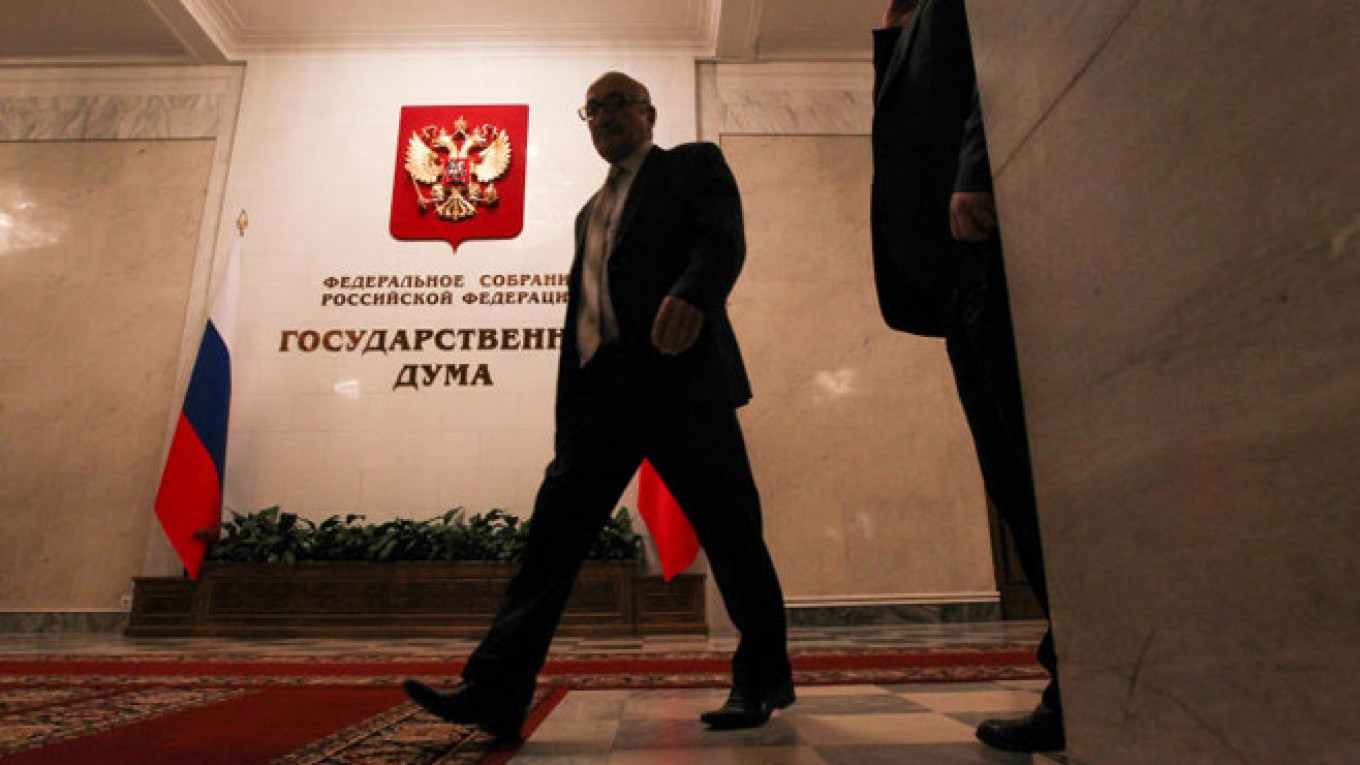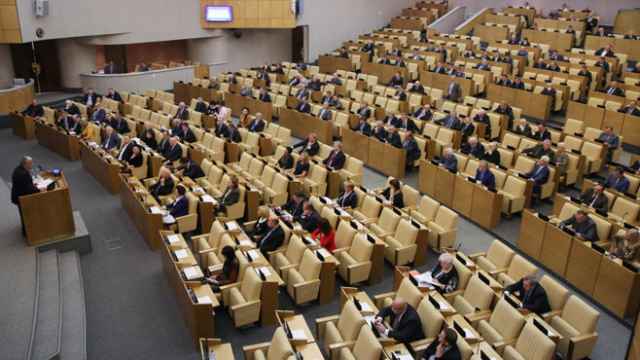Russia's State Duma deputies were told to roll up their sleeves and tighten their belts to grapple with the country's struggling economy at the spring session's inaugural sitting Tuesday, a task that falls beyond the rubber-stamp legislative body's capabilities, according to some lawmakers and political analysts.
Amid a currency crisis, plummeting oil prices and rising inflation, Duma Speaker Sergei Naryshkin warned deputies they had their work cut out for them. Despite its pledge to curb inefficient spending, the Duma's dependence on presidential guidance and the public's increasing distrust of the federal legislative body seem likely to hamper its chances of fixing Russia's budgetary and economy woes.
"The economic crisis presents challenges and the state must be prepared to seek new solutions, whether this means supporting import substitution, employment or the introduction of new technologies in the industrial and social spheres," Naryshkin said Tuesday, according to the Duma's official website. "We have to act in such a way that the Duma remains a key forum in which to discuss these tasks."
With the economy and parliamentary control of the budget high on its agenda, the Duma pledged to crack down on the inefficient allocation of budget funds, which Naryshkin told the Interfax news agency currently amounts to a "very, very high" sum.
Finance Minister Anton Siluanov said last week that the federal deficit would not be more than 3 percent of the country's gross domestic product, RIA Novosti reported. In December, the Central Bank had forecast that figure at 1.3 percent.
The World Bank has also lowered its 2015 growth projection for Russia to negative 2.9 percent from negative 1.5 percent, as inflation climbed to 11.4 percent last month. Meanwhile, the International Monetary Fund predicted that the Russian economy will shrink by 3.5 percent this year.
The government appears to be moving to hold deputies more accountable for improving the country's dire economic situation. The ruling United Russia party has supported the government's request that it receive regular updates from the legislative body on the state of the economy, while government officials responsible for economic issues, accompanied by Deputy Prime Minister Arkady Dvorkovich, could meet with deputies next week, the RIA Novosti news agency reported.
The last time the Russian government paid this much attention to parliamentary activities was during the financial crisis of 2008, according to Prime economic news agency.
"Duma deputies will have to change the budget in one way or another," said Dmitry Oreshkin, head of the Moscow-based Mercator political research group. "It is logical to have them be part of the process. What will be left for them to do if they cannot debate about the economy?"
Executing Orders
Despite the Duma's unavoidable role in adjusting the budget, the legislative body has little chance of independently overhauling it, according to Oreshkin and some deputies.
Mikhail Serdyuk, a member of the Duma Committee on Budget and Taxes, told The Moscow Times on Tuesday that he was optimistic deputies could come together to devise a roadmap to get the country back on track economically. He did not conceal, however, that it would be a challenge.
"This won't be a simple task," he said. "Some initiatives on which spending was efficient no longer make sense because of the economic situation. In other instances, funds are being misspent at the governmental level. But not everybody is ready to change that."
Deputies contacted by The Moscow Times on Tuesday would not elaborate on which initiatives would be revised or which projects would be slashed. The Duma's work to halt inefficient spending could become clearer once President Vladimir Putin is briefed by Prime Minister Dmitry Medvedev on Wednesday about his Cabinet's proposals to salvage the economy.
"The Duma is powerless," said Dmitry Gudkov, an opposition lawmaker who has served as an independent since being ousted from the Just Russia party in 2013. "It obeys the presidential administration. All presidential initiatives are adopted. The Duma just executes [the Kremlin's wishes]."
Questionable Decisions
As Russia tackles its struggling economy and the vertiginous devaluation of its currency, the Russian public appears to have become disenchanted with federal lawmakers, with few expressing any hope that the Duma could be a catalyst for change.
The lower house of parliament, replete with retired athletes and pop stars seeking a sinecure, has gained a reputation as a disjointed — and at times comical — legislative body.
United Russia lawmaker Vadim Bulavinov announced he was suing Russian newspaper Izvestia and its media holding for publishing an article last year that alleged that he had been ordered off a plane because he was heavily inebriated, the RBC news agency reported last week.
Two other deputies from the governing party, Alexander Sidyakin and Oleg Savchenko, were notable absentees at Tuesday morning's plenary session, RBC reported. The two lawmakers had traveled to Antarctica over the holidays to climb Mount Vinson, the continent's highest peak.
Their escapade became the focus of attention last week when the two deputies could not be reached and were thought to have gone missing. Russian media have questioned the timing of their extravagant trip, which reportedly cost about three million rubles — 100 times greater than the average Russian's monthly salary. Sidyakin and Savchenko, who reported respective earnings of 11.7 million rubles and 3.5 million rubles in 2013, according to the Duma's website, are due to go before the Duma Ethics Committee over the incident, RIA Novosti reported.
Serdyuk defended his colleagues, saying that some Duma deputies had been "demonized" by the press and were hard-working lawmakers. But Gudkov, who has taken part in anti-government street protests, is not so forgiving of his fellow deputies' faux-pas.
"People who regularly follow parliamentary affairs have been disillusioned for a long time," Gudkov told The Moscow Times. "Others who follow the governing party likely do not care when and where deputies choose to vacation."
A new study published Monday by the Foundation for Social-Economic and Political Research, a pro-Kremlin think tank, reported that "only" 59 percent of Duma deputies had proposed bills in the 2014 fall session. Sidyakin — notorious for initiating a law requiring NGOs to register as "foreign agents" if they engage in vaguely-defined political activity — ranked 27th in a list of the 40 most active deputies from United Russia. Savchenko did not make the list.
Contact the author at g.tetraultfarber@imedia.ru
A Message from The Moscow Times:
Dear readers,
We are facing unprecedented challenges. Russia's Prosecutor General's Office has designated The Moscow Times as an "undesirable" organization, criminalizing our work and putting our staff at risk of prosecution. This follows our earlier unjust labeling as a "foreign agent."
These actions are direct attempts to silence independent journalism in Russia. The authorities claim our work "discredits the decisions of the Russian leadership." We see things differently: we strive to provide accurate, unbiased reporting on Russia.
We, the journalists of The Moscow Times, refuse to be silenced. But to continue our work, we need your help.
Your support, no matter how small, makes a world of difference. If you can, please support us monthly starting from just $2. It's quick to set up, and every contribution makes a significant impact.
By supporting The Moscow Times, you're defending open, independent journalism in the face of repression. Thank you for standing with us.
Remind me later.






